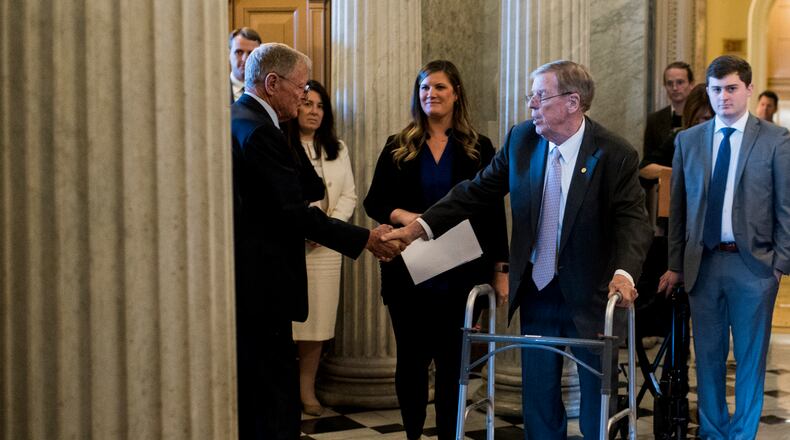The daylong good-bye to Johnny Isakson in the U.S. Senate chamber on Tuesday could not have come at a better time for both Gov. Brian Kemp and Kelly Loeffler, the finance exec who is expected to take Isakson's place in Washington.
There was something in the day for other Georgia Republicans, too, who perhaps should be paying more attention to what their party is becoming.
“I see things happening, that I’m asked about by people, that scare me. And I’ve heard some people I know say some things that terrify me,” Isakson said. “We’re better than the hate and vile statements that some people make – and we’ve got to be better than that.”
We’ll delve into that floor speech to his colleagues in a few more paragraphs.
But for Kemp and Loeffler, just as important as what Isakson said is what the senator has been over the last 45 years – a solid voice of suburban Republicanism. Suburban Atlanta gave birth to the modern GOP in Georgia. Isakson, a Cobb County native, was one of its founders.
And so Tuesday’s celebration of Isakson career served as an essential prelude for Wednesday’s formal state Capitol unveiling of Governor Kemp’s most important political decision to date.
The unspoken message: Suburbia still matters.
President Donald Trump has privately, but not publicly, urged Kemp to name U.S. Rep. Doug Collins to fill Isakson’s shoes. Various rightward pundits, Sean Hannity of Fox News most prominent among them, have championed the Gainesville congressman as well.
Most have emphasized Collins’ role as a top defender of Trump against the impeachment inquiry in the U.S. House. And Loeffler’s past support of Mitt Romney’s presidential ambitions is now seen as a major character flaw.
Even so, Kemp has refused to bend. The governor even escorted Loeffler to the White House to persuade Trump that he might be, er, wrong. Brave move, that.
We do not know what was said there. For weeks, Kemp has been mum on the topic. Loeffler, too.
(Note to Hannity: You and I don’t mind being called “jackasses” — in part because we so admire accurate phrasing. But governors can be an overly sensitive lot, and when trying to persuade a chief executive to explain himself, on-air use of the word becomes counterproductive.)
With all that silence, we’re left to make a few suppositions about Kemp’s intentions.
In choosing Loeffler to replace Isakson in Washington, the governor has acknowledged that suburban voters, though neglected by his own gubernatorial campaign in 2018, remain essential to the future survival of the Republican party in Georgia. They are something to be won back.
Likewise, Loeffler’s selection is recognition that a 17-year emphasis on rural voters for statewide GOP victories — begun by Sonny Perdue with his 2002 run for governor — is approaching its finite limit. Rural Georgia is bleeding voters. Urban and suburban Georgia are growth territories.
U.S. Sen. David Perdue, who is about to become Georgia’s senior senator, had asked Kemp to keep in mind that whoever the governor appoints would become his running mate. Both Perdue and Loeffler will appear on the November 2020 ballot, though Loeffler will be in a “jungle” special election that will pit her against Democrats and Republican challengers alike.
But we forget that Kemp’s first term as governor could depend on whether Republicans retain control of the state House in 2020 – which means preventing Democrats from picking up 16 seats in the chamber.
Many of those vulnerable Republican seats are in north metro Atlanta. Winning the votes of white women who have fled President Trump will be essential – even though he’ll be on the November ballot.
Former congresswoman Karen Handel’s Sixth District comeback bid against U.S. Rep. Lucy McBath could be one lure. Loeffler, a fresh face in politics, is a more likely one.
Which brings us back to Isakson, his big day, and his speech on the floor of the U.S. Senate.
“We still have some people in the United States of America who play the hate card. We have some politicians who will dance around the issue of hate. They won’t use the buzzwords, but they will get awfully close to it. They did in Charlottesville,” Isakson said.
That was as close as he came to referencing President Trump. Though at one point, Isakson stopped himself – to some chuckles — as he uttered the phrase “quid pro quo” to describe his approach to bipartisanship.
Isakson leaves the Senate as strange things are happening in his party, even here. Many are insisting, for instance, that only the current resident of the White House has the wisdom to select the next U.S. senator from Georgia — never mind the state constitution. This week, the leadership of the Georgia GOP declared President Trump to be the winner of the March 24, 2020 Republican presidential primary in Georgia. His will be the only name on the ballot.
Isakson hasn’t been a Trump enthusiast. People also forget that, stylistically, he was the antithesis of a bomb-throwing Newt Gingrich, whom he replaced in the U.S. House to begin his Washington career.
On Tuesday, senator after senator described Isakson as a man of exceptionally smooth edges. “One word used to describe Senator Isakson is not often found in the halls of Congress – ‘kind,’” said Senate Minority Leader Chuck Schumer, D-N.Y.
On Wednesday, Kemp will place his bet that, one year from now, voters will be looking past Trump – for something more like Isakson.
About the Author
The Latest
Featured




